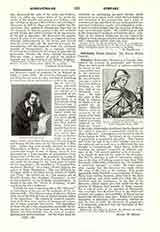

Schwarz (SCHWARTZ), BERTHOLD, a German friar, reputed the inventor of gunpowder and firearms. There has been much difference of opinion regarding the bearer of this name and his share in the discovery attributed to him. He was a Franciscan, and is said to have been born in Freiburg in the first half of the thirteenth century. He took the name of Berthold in religion, to which was appended the adjective Schwarz (black), either on account of the color of his habit or because he was looked on as being addicted to the black art. It was in the course of his studies in alchemy that he discovered the explosive properties of gunpowder which he applied to firearms. A monument was erected to him in his birthplace in 1853. The history of the invention of gunpowder is wrapped in obscurity. The Chinese and Arabs are said to have been familiar with burning mixtures, and as early as A.D. 660 Greek fire was brought to Constantinople. Roger Bacon (1246-94) mentions the explosive properties of saltpetre mixtures in his “De secretis operibus artis et naturae”, c. 6, though he does not lay claim to the discovery. The first to attribute it and its subsequent application to the friar of Freiburg seems to have been Felix Hemmelin (1389-1464) of Zurich in his “De nobilitate et rusticitate dialogus” (c. 1450). He states somewhat vaguely that the discovery was made within 200 years of the time of his writing. This would apparently make Berthold a contemporary of Bacon. Many later writers, however, place him in the fourteenth century, and while some give 1354, the date inscribed upon his monument, as the time of his discovery, others simply give him credit for the invention of firearms and notably of brass cannon. For a critical study of the question cf. Hansjacob, who concludes that Berthold lived in the thirteenth century, and suggests the possibility of Bacon having learned the discovery from him. While it is perhaps impossible to determine with certainty whether he was the first to make the discovery of gunpowder, it is commonly admitted that the invention of firearms is due to him.
HENRY M. BROCK

